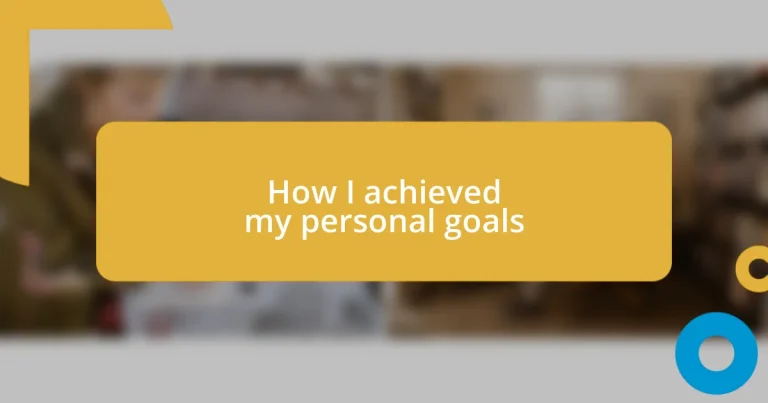Key takeaways:
- Setting clear personal goals and breaking them into manageable parts can significantly enhance motivation and achievement.
- Understanding the motivation behind goals, including personal significance and potential impact, is crucial for maintaining focus and resilience.
- Celebrating achievements, no matter how small, and reflecting on progress can sustain motivation and reinforce commitment to future goals.
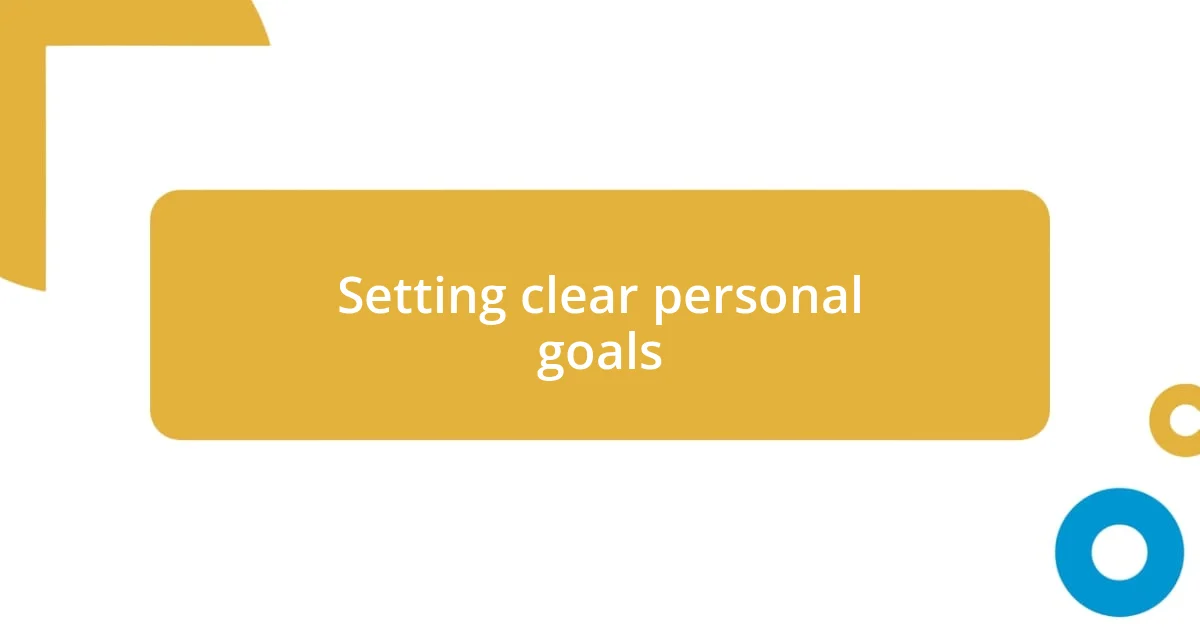
Setting clear personal goals
Setting clear personal goals is like shining a flashlight on your path; it illuminates what’s ahead. I remember when I decided to run my first marathon. Initially, it seemed daunting, but by breaking it down into weekly mileage goals, suddenly, it felt achievable. What do you want to accomplish, and how can you simplify it into manageable parts?
Visualizing my success helped me stay motivated. For instance, each time I logged a run, I would picture crossing that finish line, exhilarated and proud. This emotional connection transformed my goals from mere plans into a passionate quest. How often do we allow ourselves to dream vividly about our goals?
Accountability can make a world of difference too. I shared my marathon goal with friends and family, and their encouragement spurred me on when doubt crept in. It’s fascinating how sharing our ambitions can create a support network that pushes us to achieve more. Isn’t it empowering to know that others believe in our dreams as much as we do?
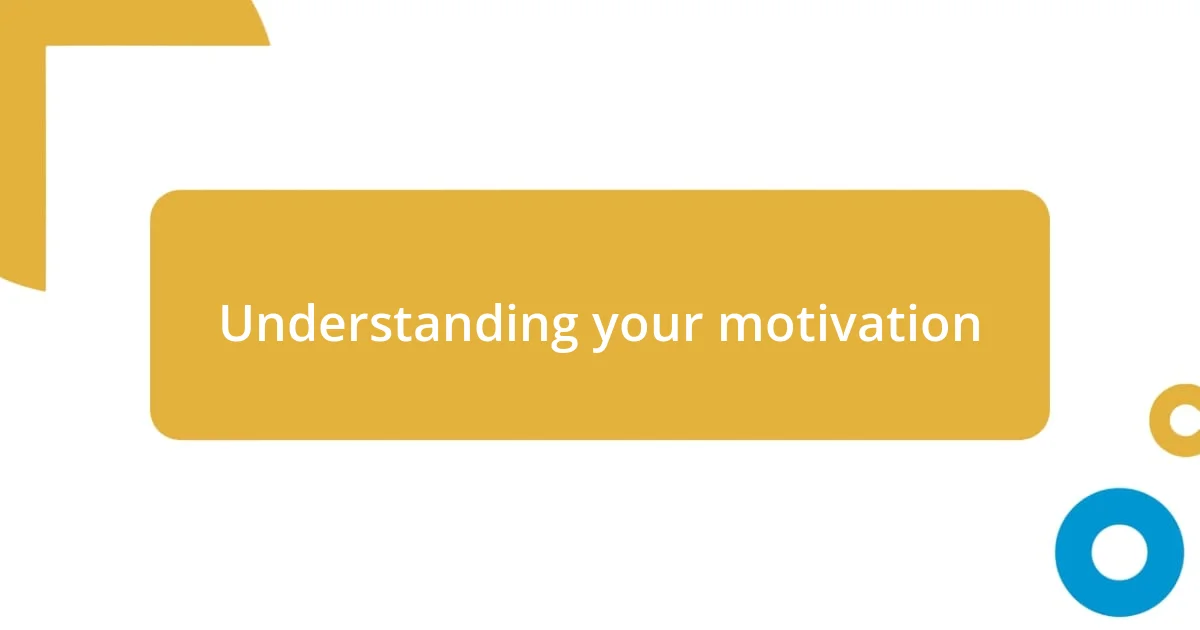
Understanding your motivation
Understanding your motivation is crucial for success, and I’ve learned that mining deep into the “why” behind my goals makes all the difference. For me, it wasn’t just about finishing that marathon; it was about proving to myself that I could overcome physical and mental hurdles. When I focused on how running made me feel stronger and more confident, the daunting task seemed less intimidating and pushed me to lace up my shoes day after day.
To tap into your motivation, consider these reflective questions that have helped me clarify my own desires:
- What makes this goal personally significant to me?
- How will achieving this goal impact my life and those around me?
- What fears or doubts do I need to confront to push through?
- Who can I turn to for support and encouragement?
- What smaller milestones will remind me of my progress and keep me inspired?
I encourage you to take a moment and really dig into these questions. Understanding your motivation isn’t just about the end goal; it’s about embracing the journey and the emotions tied to it.
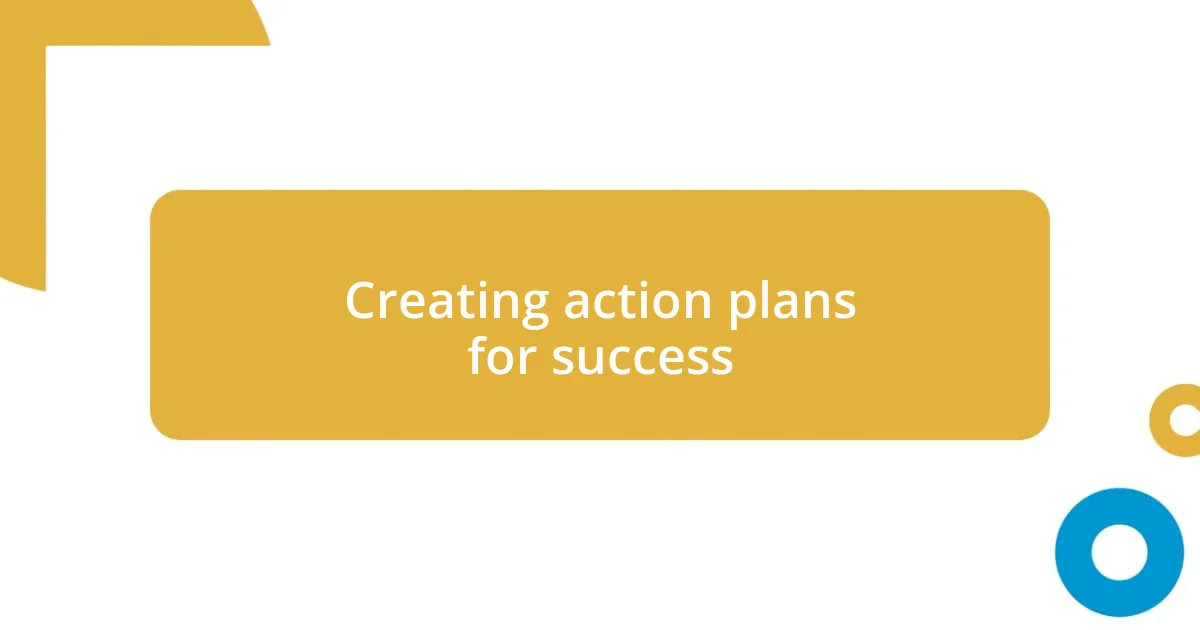
Creating action plans for success
Creating a successful action plan is all about breaking down your goals into actionable steps. I’ve found that identifying the specific tasks required to reach my goal is not just helpful but essential. For example, when I aimed to write my first book, I divided the project into manageable parts: outlining chapters, writing daily word counts, and setting deadlines for revisions. This way, each small victory kept my momentum going and made the big project feel like a series of achievable milestones.
Consider using a timeline for your action plan, like a roadmap guiding you toward your destination. I often create monthly or weekly goals to check my progress. For instance, while training for that marathon, I mapped out my running schedule: long runs on Sundays and shorter runs during the week. Each completed run was a step forward, and this structure fostered a sense of accomplishment that I cherished. How are you tracking your progress toward your own goals?
Don’t forget to review and adjust your action plan as needed. Sometimes life gets in the way, and that’s okay. I recall a period in my training when unexpected responsibilities derailed my schedule. Instead of feeling defeated, I revised my plan, incorporating shorter workouts and re-prioritizing my time. This flexibility allowed me to stay committed without sacrificing my progress. Remember, it’s less about sticking rigidly to your plan and more about adapting it to ensure your ultimate success.
| Action Plan Component | Example from My Experience |
|---|---|
| Defining Specific Tasks | Outlining chapters and setting word count goals for my book |
| Setting a Timeline | Creating a running schedule with long runs on Sundays |
| Reviewing and Adjusting | Modifying my training plan during unexpected life events |
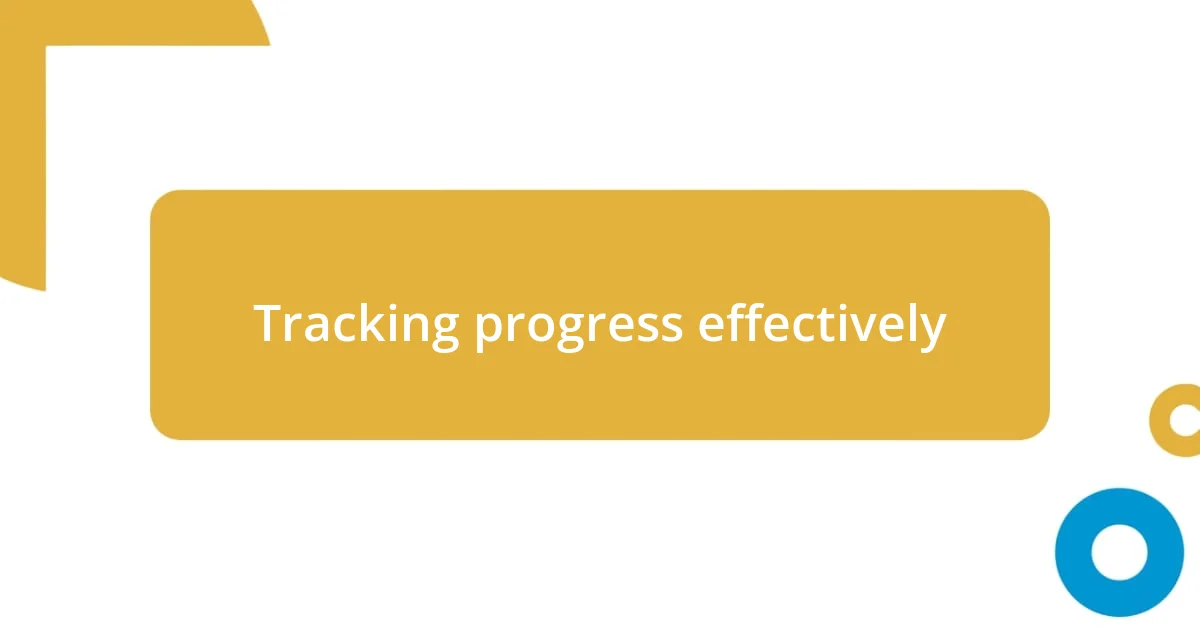
Tracking progress effectively
Tracking progress effectively is a game-changer. When I started documenting my journey, I didn’t just jot down milestones; I recorded my emotions too. I remember feeling a rush of excitement when I increased my running distance, but I also noted the frustration of hitting a plateau. Reflecting on these feelings helped me understand that progress isn’t just about numbers; it’s about personal growth and resilience.
One method that proved invaluable for me was using a visual progress tracker. I created a simple chart where I marked off each workout, and the sight of those checkmarks was incredibly motivating! As I watched my fitness level gradually improve, I felt a sense of pride that kept me pushing forward. Have you ever thought about how visual cues can impact your motivation? I truly believe seeing tangible results can elevate your spirits and drive you toward more ambitious goals.
Lastly, I learned the importance of regular reflections. Every month, I took time to analyze my performance and feelings surrounding my progress. This practice taught me to celebrate not just the big wins but also the small victories, like the days I showed up for a quick workout despite feeling tired. What moments do you tend to overlook in your own journey? Recognizing even the tiniest steps forward can significantly boost your motivation and commitment, reminding you that every effort counts.
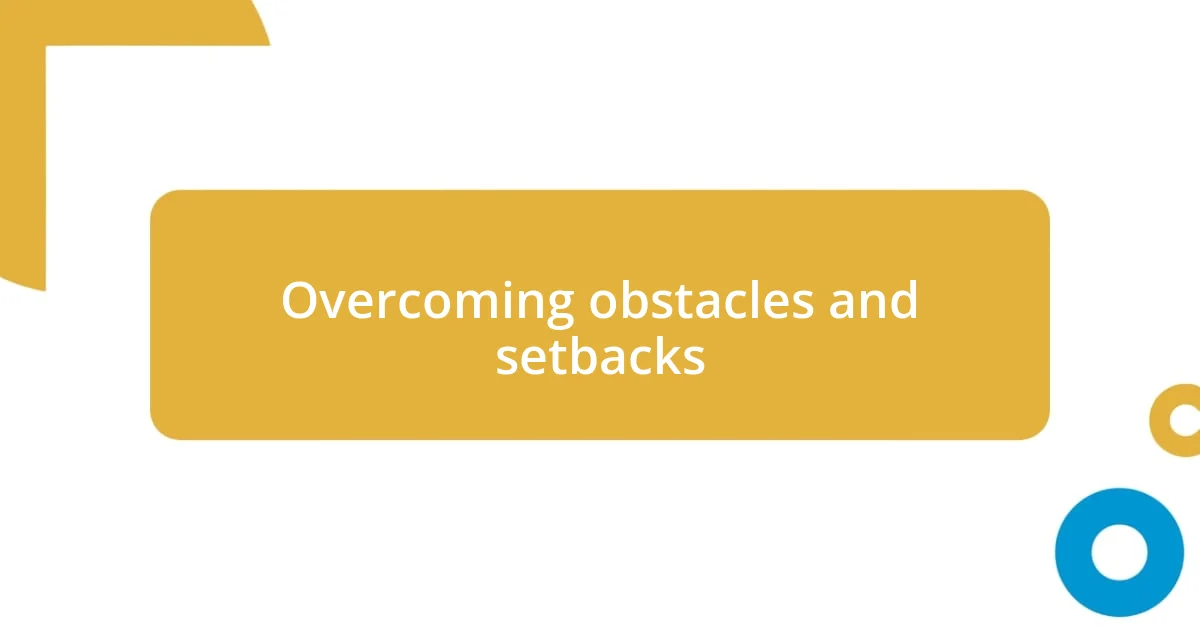
Overcoming obstacles and setbacks
Obstacles and setbacks are often the most challenging parts of pursuing goals, but I’ve learned they can also serve as powerful teachers. I recall a time when a severe illness sidelined my training for weeks. Instead of feeling defeated, I focused on what I could control—my mindset. I spent that time researching nutrition and mindfulness, which not only helped me heal quicker but also equipped me with tools to tackle future challenges.
When faced with hurdles, I find it invaluable to lean on my support network. During a critical phase of my writing journey, tough feedback from my peers initially felt like a gut punch. However, those conversations later transformed into invaluable lessons. I reached out to fellow authors, and their insights reignited my motivation. How often do you seek support during tough times? I’ve realized that sharing struggles can reveal solutions I never considered on my own.
Lastly, I’ve come to embrace the idea that setbacks often lead to breakthroughs. One of my most significant goals was to complete a triathlon, but a last-minute injury almost knocked me out of the race. Instead of giving up, I shifted my focus to the parts of the race I could still participate in. This taught me a vital lesson: adaptability is key. Every bump on the road can reshape your journey—are you open to finding new paths when faced with obstacles? Seeing setbacks as opportunities rather than failures has fundamentally altered how I approach my goals.
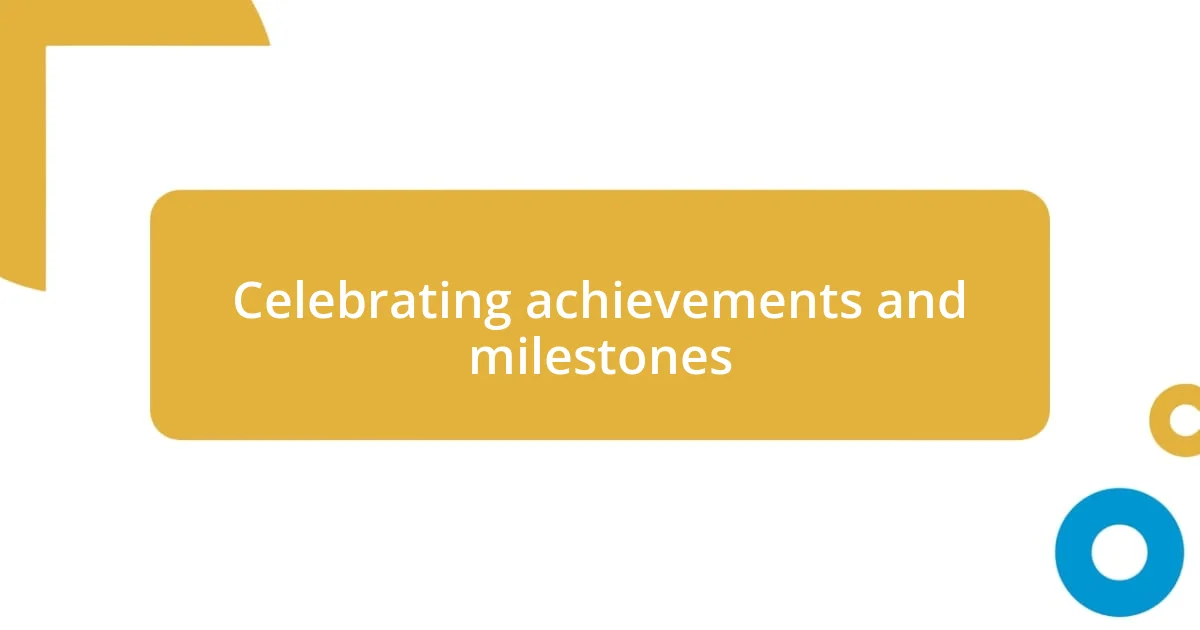
Celebrating achievements and milestones
Celebrating achievements is essential in maintaining motivation and momentum. I remember the thrill of crossing the finish line of my first half-marathon. It wasn’t just about completing the race; it was a culmination of months of dedication, training, and overcoming self-doubt. That moment felt like a warm embrace—an acknowledgment of my hard work. Have you ever taken a moment to truly savor your achievements? I believe those celebrations are crucial. They remind us of our journey and reinforce our commitment to future goals.
Milestones, big or small, deserve recognition. When I finally reached my goal weight, I threw a small gathering with friends to celebrate. We shared laughter, stories, and a delicious cake that was absolutely guilt-free. It was a beautiful fusion of personal achievement and shared joy. Celebrating together not only amplified my happiness but also motivated my friends to reflect on their own aspirations. How do you celebrate your milestones? Sometimes, a simple acknowledgment from loved ones can propel us further than we realize.
One of the most powerful ways I’ve celebrated my achievements is through journaling. After completing a project or reaching a goal, I would take the time to write down my thoughts and feelings—what I learned, who supported me, and how I can build on that success. It’s like creating a treasure trove of memories that I can revisit whenever I need encouragement. Have you ever documented your victories? I find that revisiting those proud moments offers a refreshing perspective, especially during challenging times, serving as a reminder of how far I’ve come.












